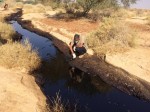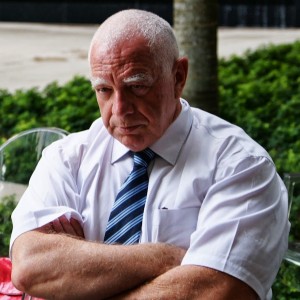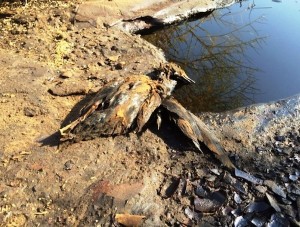Arava International Centre for Agriculture Training executive director Hanni Arnon spoke to audiences across Canada as part of a Jewish National Fund nationwide tour. (photo by Rebeca Kuropatwa)
As part of a nationwide tour, with stops in Ontario, Manitoba, Alberta and British Columbia, Hanni Arnon, executive director of Arava International Centre for Agriculture Training (AICAT) of the Arava Development Co., introduced the training program to Canadian audiences.
In 1994, Arnon founded AICAT. The goal of the centre is to educate students from countries around the world on how to form successful agricultural businesses. Her cross-Canada talks – Feeding the World through Education – were organized by Jewish National Fund of Canada, its local branches and support from various other local Jewish organizations.
In her presentation in Winnipeg, Arnon shared her personal story about having been born and raised in Jerusalem. About 30 years ago, she chose to follow her dream and move with her husband, Moti, to the Arava region.
“We were looking for a life with challenges and fulfilment,” she said. “We wanted our children to grow up connected to nature and to be a part of a community that understands and appreciates the meaning of hard work, Zionism, solidarity and friendship.”
Some 900 families live in the central Arava, which is a desert. Given the harsh climate, general lack and poor quality of water, residents had little choice but to find creative solutions and overcome the daily difficulties they encountered. They have gathered more than 50 years of experience and research, with science as the foundation.
“With hard work, we made the desert bloom,” said Arnon. “We are the world leader in desert beautification and a prime example for effective water use. We have the ability to think outside the box and make the impossible possible.”
The global population is reaching more than seven billion, including 800 million people in poverty. Arnon is looking for a way to feed them by focusing on collaboration and the transfer of knowledge, which she feels will lead to empowerment and the opening of opportunities. She acknowledged that knowledge itself is not enough, that it needs to be coupled with training.
“For over 20 years,” she said, “AICAT has had the great privilege to bring every year, with the permission of the Israeli government, hundreds of students from 12 developing countries, such as Vietnam, Laos, Thailand, Nepal, Cambodia, South Sudan, Nigeria, Rwanda, Uganda, Ethiopia and Indonesia – a multitude of cultures, religions and nationalities that have participated in the unique program across borders.”
AICAT provides students with practical knowledge in everything from vegetable production to business management, marketing, research, technology and strategic thinking. The goal is for students to return home to “establish their own agriculture business and improve their farms,” said Arnon.
According to Arnon, AICAT – which has 40,000 graduates to date – teaches the most important lesson – that if you want something earnestly enough, you can make it happen. Every year, she said, she sees how, after 11 months, the students have a light in their eyes and are keen to apply the new ideas to helping their home countries.
“We give them hope and self-confidence to follow their dreams and improve their lives,” said Arnon. “They become entrepreneurs and future leaders of their countries.”
Arnon noted that not only do the students gain the knowledge and inspiration, but they go on to become goodwill ambassadors for the state of Israel. “They go home and talk about how much Israel means to them,” she said. “This is positive action on the Israeli side, which shows Israel in a different light.”
When Arnon was asked a question about cooperation with the Jordanians, she spoke about the different ways AICAT works with neighboring farmers. “Just to make sure you understand how close we are, the place where our fields end, this is the border,” she said. “It’s an open border with no fence. We have a peace agreement, so it’s a quiet border. We send our expertise to support farmers in Jordan. We are open for any collaboration with the Jordanians and would especially like cooperation with our neighbors.
“We also have a project [called] Clean Arava and we must do that together with the Jordanians, because we are so close to them. This is one of the projects we are doing together.”
Arnon explained that the Arava region is the biggest vegetable exporting area in Israel, producing more than 60% of the fresh vegetables Israel exports. The main crops are sweet peppers, tomatoes and melons, but they also grow flowers, grapes, mangos and dates. (The Arnon family owns a large date farm.)
As for the students involved in the project, Arnon noted that they pay for a one-way ticket to Israel, a medical exam and a passport. They can work while in Israel to earn their fare back home and tuition fees, while also taking home with them $2,000-$3,000 to help put into practice what they have learned.
“We see the impact on students,” said Arnon. “They are going back home as leaders, entrepreneurs, with knowledge, skills and money to start an agricultural business. Many of them, about 30%, continue on to higher education.”
The original inspiration for AICAT was the need to teach Thai workers in the 1990s about agricultural systems. Arnon, having been trained as a teacher for that work, immediately felt that a school should be created to teach the subject on an ongoing basis to as many students as possible.
AICAT presently teaches about 1,200 students per year, but Arnon is hoping to double that number with a new campus that will break ground in March.
As for funding, no government funding or support is provided, apart from providing the students with visas. It is JNF that provides support for facilities, dormitories and programs.
Ariel Karabelnicoff, director of JNF Manitoba and Saskatchewan, closed the Winnipeg event by sharing that the school has 80 students from Indonesia, an Islamic country with no diplomatic ties with Israel.
While in Winnipeg, Arnon also took time to speak to University of Manitoba students and visited the Canadian Museum of Human Rights. In Vancouver, hosted by JNF Pacific Region, she spoke at Temple Sholom, Beth Israel and Schara Tzedeck.
The talks were timed with the celebration of Tu b’Shevat and JNF’s fundraising campaign for a 6.5-kilometre park in Eilat. For more information on the campaign, email [email protected] or call 604-257-5155.
Rebeca Kuropatwa is a Winnipeg freelance writer.




